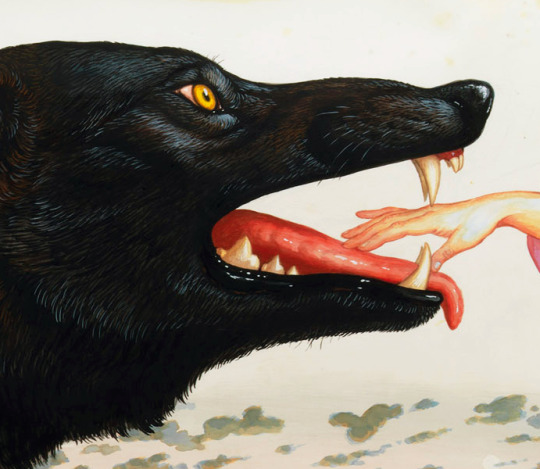Text
i have a couple of asks so making a psa. i am on semi-hiatus bc i am technically trying to finish writing my phd thesis (very badly). i still post on my main blog because i am a procrastinating fool but you'll notice it's rarely stuff where i carefully read/re-read books to give detailed commentary, it's just whatever i have organically on my mind that day. as soon as i am free-ish i will return to being more present on here too. i just dislike writing poorly informed posts and in order to answer asks properly i usually prefer to have the time to go back to the books and freshen up whatever is needed
4 notes
·
View notes
Text


-C. Fred Alford, What Evil Means to Us
35 notes
·
View notes
Text

- C. Fred Alford, What Evil Means to Us
45 notes
·
View notes
Text







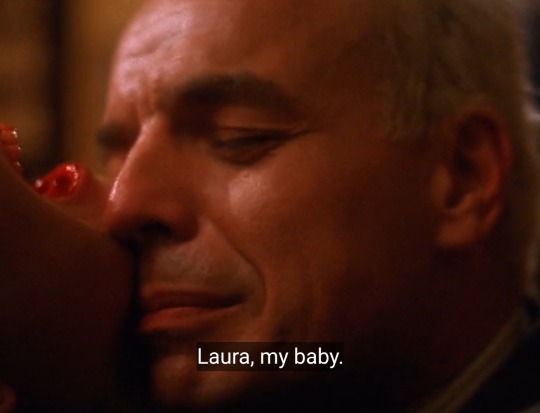


Judith Lewis Herman, Father-Daughter Incest • Anne Rice, Interview with the Vampire • Twin Peaks • Jennifer Lynch, The Secret Diary of Laura Palmer • Alex Irvine, John Winchester's Journal
167 notes
·
View notes
Note
your posts on Anna and Leah, just in general all your posts are so interesting!!! always really loved the potential of this series especially in regards to the female characters. it’s funny that pb stated in an interview - I think? - that Leah gets along with the rest of the women in the pack but its barely shown. and does Anna have a life outside of Charles (mercy and Adam guilty of this too)? I remember reading bright burn where it’s mentioned she made a brownies from a recipe mercy gave her but like it’s kind of a throwaway line.
hi, thank you so much, that's very nice to know!
yeah i also remember reading something like that - i tend not to delve too much into interviews etc because, at the end of the day, what's not on the page doesn't really count, to me. i can see the interest! it's just that pb could say a million times there's a florid community of women braiding each other's hair off-screen and that still would not change the actual content of her books.
with that said, i don't think the absence of too friendly relationships between female characters is, in isolation, something that necessarily renders media regressive. es. a logic of subjugation under patriarchal structures tends to create material conditions that promote women's confinement within the domestic sphere and encourage a role of totalising centrality for men with the power to dictate their fate: how does one go about creating a meaningful life when there's no possibility to fully evade these parameters? or even: within that domestic sphere, deep relationships between women are often found in familial ties. what happens, then, in a childless society of semi-immortal beings whose original families are mostly dead? and so on. these are possible interesting angles to me.
all this to say: fiction doesn't need to fulfill a reparative function to be interesting and it doesn't need to be a 1:1 representation of reality. i am not bothered by the lack of female friendships per se, rather by the fact there are no layers to it. pb has created a setting where "mating" is the only realistic venue of security and social advancement for a woman in a werewolf pack. werewolves are violent and in constant competition, so that fights and killings can be expected from every angle. a wolf only recognises their other half in a mated pair as untouchable, meaning even children and other relatives are not safe. given the relative absence of communal work, including that of child-rearing, that would incentivise the fostering of external relationships, a certain morbid isolation within the couple makes some kind of sense. it's just that the story effaces all elements of conflict that would emerge from this structure and that makes it dull. such soffocating closeness can be either played as a sacred union of equals against strangers or a constricting exile or even both but not without some tearing and straining. pb wants to confer all her main relationships a pacifying power without ever bothering to clarify what needs pacification and what are the steps to get there. the underexploration of the characters' inner lives coupled with the lack of overarching thematic scaffolding deprives the misogyny in the books of any deeper narrative meaning, so it's just...there.
7 notes
·
View notes
Text

-Rosaria Champagne, The Politics of Survivorship: Incest, Women's Literature, and Feminist Theory
99 notes
·
View notes
Text
trying to pinpoint the author's intentions is a process that concerns but does not exhaust textual interpretation imo. sometimes it's impossible to guess. or things emerge from the page that no one consciously thought to put there. or, other times, the reader and the author's intepretation are going to greatly diverge based on different worldviews. es. it's very possible pb wrote bjw and bran's story genuinely thinking about a loving relationship complicated by some "cultural differences" and individual clashes. however, placing bran as a white man in (what would become) montana in the 1800s has some implications. the story of the wide "wild" west as a great expanse of terra nullius free to take without human cost was just that, a story. the historical reality of the process is one of colonisation and genocide, which is ongoing and from which usamericans still benefit. bran grabbing land west of the mississipi during this process and settling there marks him as someone that actively participated in or at least abetted or at the very least directly profited from that colonisation and genocide. if this context is taken seriously, his relationship with bjw necessarily assumes some sinister elements (which can coexist with the romantic ones!) - regardless of whether pb intended for those elements to be there. the narrative about a white man "having to" transform an indigenous woman in order to save her, closely tracks the narrative about white people's chosen mandate to colonise "savage" lands in order to bring "civilisation". bran even does both! whether he forced bjw into her turning and/or mating is not irrelevant and i don't think it's strongly implied that he did, from a literal pov. but that doesn't mean that the story still doesn't stand, figuratively, for coercion disguised as paternalistic benevolence. determining whether this framework is endorsed or criticised (or at least considered critically) within the text can tell you the position the story takes on the issue. it doesn't necessarily reflect pb's full opinion on it and it certainly doesn't have to move the needle on yours.
#this is not a complaint#just a perspective#patricia briggs#mercyverse#bran cornick#blue jay woman#like if the books don't address the elephant in the room fine#but i don't think that means we also should ignore it
6 notes
·
View notes
Text
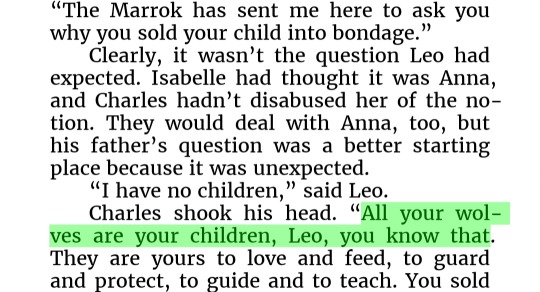
that's what i thought you'd say, charles son of bran lol
bran was never going to escape the incest allegations was he? all the wolves on the continent are his. and then some. he should have joined a cruise for single parents on the other side of the world smh
8 notes
·
View notes
Text
still thinking about the apparent primacy of sam in bran's affections (over his mother, over mercy, over charles) and how he had no qualms sacrifing mercy for his sake, much like he had no qualms breaking his own rules to save sherwood. much like, in a looser comparison, he ended up killing his mother to save sam. this factual dismissal of women in his life creates an interesting wrinkle in the argument his deepest and therefore most dangerous attachments have been to women. it comes to mind that only a very selective reading of his own history and a certain worldview would bring bran to insist that sexual and romantic concerns sealed through a mating bond are exclusively responsible for his states of madness and thus need to be uniquely controlled.
this statement does not fully reflect what happens in the books or at least different interpretations would be possible. the first advent of his berserker was marked by a risk to sam's life. after blue jay's death, he was barely holding on to the monster but he thought sherwood's death would be the thing to tip the scale if he didn't save him. in other words, i don't know that the mating bond being the natural locus of bran's battle with his wolf due to the unparalleled strength of feelings it generates is such an uncomplicated truth. in both the most notable examples of this struggle, bran's descent into madness was also associated with a male relative. yet, he doesn't try to deliberately distance himself from sam or sherwood. a possible reason for this could be that they are his oldest relationships, it's too late for him to control his feelings. but in that case, couldn't he at least recognise they also pose a risk and mark its nearness when they are in danger? yet, this is not what we are told, this undercurrent is completely absent when their lives are threatened.
when looking at bran's reasoning closely, madness doesn't seem to descend directly from grief. no, bran believes it stems from one of two things (which are in some ways the same thing): either witch magic or romantic love. for bran to believe this, a specific intepretation of events must be accepted. one, that his first madness was not caused by fear for sam's life per se, but by the fracturing created when having to choose between two enormously strong bonds. whether he considers one natural and the other magically plasmated or recognises that love for his mother stayed his hand during centuries of slavery and made the actual choice to kill her soul-rending, we don't know. but figuratively both possibilities work towards the same purpose: that he very nearly killed his son for her. which is exactly the breach of personal values he also risked when he lost himself after blue jay's death. and while he didn't kill charles, he breached another of his taboos by forcibly turning and mating leah. by his own words, he doesn't think this would have happened due to fear for sherwood's life alone, it was blue jay's death that brought him on that edge.
curiously, it's sam that brings bran back to himself the first time. if he is not to be read as a cause for his madness, he is certainly placed as his saviour from it. the second time, it's sherwood's call that saves bran by providing him with leah.
if we put events in this neat little boxes, bran's beliefs make a little more sense. in the symbolic space of his mind, a strong attachment to a woman is what has historically driven him to the verge of things beyond reason. to madness in the form of dissolution of his beliefs and, therefore, sense of self. what is the monster coming out if not this? while strong attachments for male relatives have provided a more sensible kind of love. one that can even dispel the madness*.
as already stated, this is a very selective reading. whether we take it at face value or consider this bran's subjective interpretation, the overall message remains the same. this recurrence of events bakes into the figures of the cornick witch, blue jay, leah, mercy, an anxiety over the danger of an inversion in patriarchal order and values when faced with women's agency. the (im)material power of a magic spell gets figuratively equated to the spell love can cast and then that loving connection is again made more tangible through the creation of a different (im)material bond. it's a displacement of blame similar to that between asil and mariposa, the confusion of power dynamics that paints men as victims unable to avoid obiedence to their sexual impulses and women as their puppeteers for having simply evoked them. bran is the dangerous one but it's not him being kept under tight control.
this misogynistic thrust ties together both the causes and consequences of bran buying into the selective intepretation given above. he projects blame for his actions on the influence women have on him because he is already steeped in a mentality that facilitates this, because to control them is easier than controlling himself or other men, because the antecedent of his mother's actual controlling behaviour gives him reason to consider this anxiety justified. as a consequence, while it is truly debatable that his feelings for his male relatives (even if not romantic) are actually less intense, he only feels the need to distance himself from women he perceives as sexually dangerous. which prevents them from becoming as important and allows him to keep prioritising the bonds he deems stable and salvific**. and on an on in a neat little cycle.
*as an aside, i know anna also saves bran from going berserker during cry wolf. i don't know whether pb is rigorously creating a thematic weaving of events, i am just picking up the intrinsic meanings that emerge from certain patterns whether she wants it or not. anna represents a divergence that confirms the pattern, in the sense that to pb she does represent a feminine benefic power that is exceptional in the landscape of negative female figures. but it's a power that is strongly tied to submission. it reinforces the idea that women do have control over men when they attract their affections and that they can force these feelings on them, but erases related anxieties by making the speller devoid of independent goals and any material control over her circumstances, so that this power is neutralised of any dangerous connotation. i find this very boring compared to the rest of the puzzle of bran's life so i am electing to the dedicate little tought to this.
** i know i just said i am not sure pb is being too rigorous in weaving a theme here, but i do wonder if the "substitution" that occurs when bran changes leah instead of sherwood and is thus taken out of his madness is meant as a deliberate turning point. one where leah, by virtue of this confusion, is granted both a salvific and threatening role in the handling of bran's wolf and can reconcile the roles as two sides of the same coin. i mean clearly this element is present, i am just wondering how much of a deliberate connection it has with the larger picture. (and obviously the reconciliation is not necessarily less objectifying, per se)
8 notes
·
View notes
Text

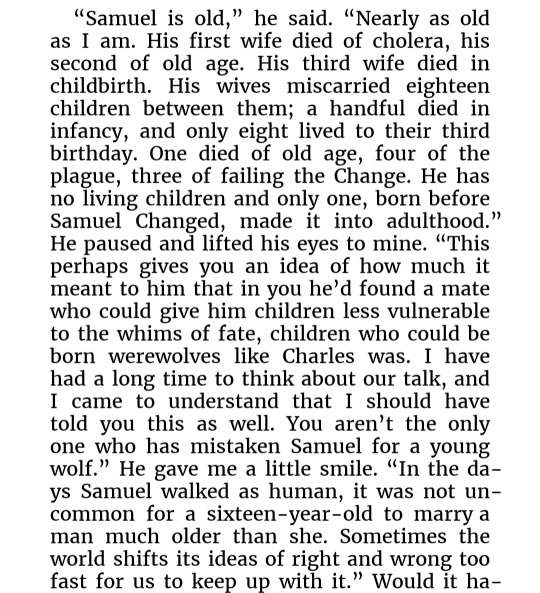
btw i don't believe for a second that bran bought his own tale about sam's sob story. he is perfectly aware of how predatory sam's behaviour was, as well as his own. the old age excuse is anyway spurious: people have always abused young girls because they had the power to do so and their interests were subordinated to others, not because no one understood it harmed them. in a different setting, however, i could at least buy a retained normalisation of this harm. but just two seconds before this bran told mercy that at sixteen she had been too young to know what sam wanted. he is not unaware. he hasn't changed his tune because he has gained a new appreciation for sam's perspective. he is just lying through his teeth to convince mercy to take sam's back, in a last attempt to save his life. he sacrificed her before, when he exiled her instead of him, and he is sacrificing her now. maybe they should all start being more jealous of sam actually
13 notes
·
View notes
Note
love all your posts on pb’s books! I’m so glad I came across your blog! what’s your opinion on Leah’s relationships with men outside of bran and Charles? namely Sam, Asil, and Tag? to varying degrees they’re pretty contentious (I’d say with Tag being the least threatening towards her)
not many thoughts about tag and asil! sorry! i never stopped to ponder about their relationship with leah too deeply as they are not very relevant to her overall story. i will keep this ask in mind for future re-reads and post something once i form a more definite opinion.
sam's trickier. his dislike for leah seems stronger than charles's and yet more shallow. a couple of reasons for this, i think:
1) charles dislikes leah as a person. he may not spend much thought on the finer points of her subjectivity and there's a rigidity to their interactions partly engendered by leah's role as bran's wife. but this role is something charles heeds mostly as a practical consideration in order to avoid his father's chastisement. overall, he sees leah as a human being not as bran's appendage. on the other hand, anyone correct me if i am wrong, i think i have only seen sam refer to leah in relation to her impact on one of his family members. somehow telling.
2) sam's relationship with bran has some ideological fractures, but it is not strained by a lack of love or respect: he perceives his place in bran's heart to be very secure. charles, who has suffered firsthand from bran's neglect and has spent a lifetime executing his darkest endeavours, is in a better position to empathise with leah and mistrust that bran's actions towards leah have the best intentions.
3) sam is also much more callous in the fundamental belief women are sexual objects and reproductive factories over which men have automatic rights. if he wasn't, he would have been much less casual and much more conflicted over his treatment of mercy, a teenager he seduced by deliberately assuming a protective role with the sole intention of making her bear his children. leah "refusing" to mother charles and "depriving" bran of the chance for a happier union must mark her as very unnatural in his eyes. and this opinion would have been reinforced by leah targeting mercy since she was young. that she tried to harm mercy is maybe the only element of personal offence he can muster against her. still it seems he only started intervening when he had the brilliant idea that mercy would make a good mate, so...
i don't think there is much more than this on his part tbh, he doesn't spend enough time considering her (as far as i can tell) for anything else to be there.
as for leah, i think she is jealous of him too, but it takes on a different quality compared to her jealousy for charles. sam was in some ways the closest thing bran had to an equal before sherwood reemerged. despite being the third to charles's second, the fact he and bran are so close in age and have so much shared history leaves an understanding between them that no one else can really penetrate. when leah came to live with bran, charles was a child and his opinion probably mattered as such. sam was already sam and probably the only person bran really trusted in the entire continent. i am theorising here, but logically i think at the beginning leah must have been simply intimidated by him and his disdain, probably angry too. overtime, as the goal for her to be bran's life partner became clearer, i think she may have started to resent his role in bran's life. with charles the competition is a bit more fair: bran loves him and will never love her, but at least the playing field to earn his respect trust etc started out somehow more even. how do you compete with samuel?
11 notes
·
View notes
Text
also interesting to me that anna's way of wielding power i.e. by manipulation is so often likened to bran's. he is the biggest monster in the world now. pretty evident he wasn't always. what childhood must one have, that their best developed skill is to disappear? secrecy, duplicity, and manipulation are almost always strategies employed when brute force or simply asking won't do. if you are put in a situation where they are repeatedly the better strategy, they become deeply seated tendencies. anna learned this after being abused for years by a group of people that held her life in their hands. bran has learned this somewhere too and from what we see in silver, it was already there before the witch turned him.
5 notes
·
View notes
Note
love your thoughts on Leah! how do you think her relationship could develop or what direction would it go in regards to Anna and Charles after wild sign?
interesting question! i don't think i have a very good answer for a "direction" these relationships could take, mainly because that depends on the larger story pb wants to tell: is this a story where people deconstruct the social order that has generated them or one where they try to find some measure of peace in it? i'll explain better under the cut.
charles and leah, i think, are at a point where they are starting to come to terms with their rivalry and identify its true cause: they were two lonely children starved for affection fighting each other because they couldn't fight bran for it. at the same time i don't know that this modicum of understanding is enough to build a relationship. even seeing the situation with a bit more clarity, the material causes that pit them against each other are not going to disappear, they have centuries of ill feelings between them, and i think at this point they simply don't like each other very much. even more importantly, i think there's a very good reason they are so repelled by each other and it took them so long to see the other's distress: they are very good mirrors. they both spent formative years of their lives with bran as the only (if imperfect) parental (or quasi) figure in their lives and attached the majority of their sense of self to their usefulness to him. to fully recognise the pain of this in the other would come very close to recognising this in themselves. they both know bran doesn't treat them well but they have become accustomed to it, i think. they grow some thick skin over it, shrug it off and get on with things (that's how bran wants them after all). seeing the other's wounds would make their own much more difficult to ignore. there's also an even more convoluted contortion in place: if they each believe bran is somehow unfair only towards them while he is right when he mistreats others, they never need to really question bran's judgement. feeling isolated in this unfairness is preferable compared to confronting the life-shaking truth that the person that moves the sun in your world may be doing it wrong. many other thoughts along these lines but this is already long.
leah and anna also have a mildly antagonistic relationship but of course there's less history there. my main issue with anna is that the only way to give her some true tridimensionality would be to acknowledge with some seriousness the difficulty of her circumstances. she was turned against her will, abused for years, and then latched onto her only saviour. he is a man she knows little when they basically marry and he is violent and possessive. her new life revolves around him and his complex family, with which she lives and has to deal all the time. at the same time, her survival depends on their support and protection, as we have seen how much her 'omega specialness' doesn't really ensure safety without material power to prevent her exploitation. there's no need to turn this into a grimdark novel, but if this context is not always waved away, suddenly she is not an unrealistic fairy always untouched by events: she is someone making strategic decisions to craft the best life possible out of her circumstances, finding love where she can and fighting for it. she has no true interest in anyone besides charles bc she is rightly guarded and balancing her new relationship with him already requires a lot of her energies. + he is the only person she can trust to be in her corner, without which she should be as lost as when they met (she also truly loves him ofc but this hardly explains her isolationist behaviour). she manipulates others not bc she is some quirky genius: it's the only way she sees to obtain what she needs when she is surrounded by aggressive impulsive people that are more powerful than her and feels the need to forestall their worst reactions. when bran and charles start giving her some latitude, she relaxes around them, especially as she realises she has things she can leverage (charles's love and her omega powers) to ensure a better condition for herself. but she is still wary of their flaws and recognises how they impact leah. yet leah is unpleasant. she sometimes makes her life more difficult but not really with the gravity and frequency people seem to assign her. even on good days however anna, so so smart and crafty and sneaky in navigating her circumstances, is almost annoyed by her: how has she not learned to do this better? how has she not learned to make herself likeable and dance around people and avoid confrontation to better obtain what she wants? but there's something else behind it, imo: leah might be brash and crude but she is real. how liberating that must be, to not always feel like your well-being depends on how quickly you past on a smile! the reason anna doesn't like leah, is the reason most people don't: to acknowledge leah's reactions as sensible is to eliminate the displacement of blame that allows life under unfair circumstances. to see leah's anger is justified means asking herself: why is she not angry? leah is a great mirror for her too. she can recognise her pain if she imagines her to be in a much more difficult position, someone to help from a higher standing. to confront her from a position of parity would mean to confront that position of parity: that she doesn't have any more material power than leah and her current better treatment stems from a momentary lucky alignment of events over which she has little control. bran and charles are, in their own ways, as unpleasant as leah is, only 1) anna needs them to survive; 2) since they also need her + they are not threatened by her they generally choose to treat her better. i am not saying anna should roll over and let leah treat her however she wants: leah enacts a similar mechanism with anna after all. disliking anna for being treated better is the only valve available to release her anger: it's not like she can accomplish much by going against bran and charles.
necessary prelude for me to say i don't care if leah and anna become fast friends. much as i don't care if leah and charles do. i think this dynamic is interesting even if it remains antagonistic, as long as either immobilism or change follow some logical exploration of this setting. it can truly go either way i would be ok with both.
#ask#i am sorry i don't think i answered exactly what you wanted#but i think this is a big turning point on which a lot of the overall meaning of the series hinges#i don't think i can speculate a lot more unless i know the general direction of the writing#patricia briggs#bran cornick#leah cornick#charles cornick#anna latham#mercyverse#alpha&omega
27 notes
·
View notes
Photo

Tetsuhiro Wakabayashi (Japanese,contemporary)
Glitter of life, 2021
5K notes
·
View notes
Text
the extracts are from the story of mariposa in cry wolf + an academic article that discusses the role of women in dracula by bram stoker by analysing how discourses over their mastery parallel those around dogs and rabid infections. these discourses cannot be fully reproduced in briggs's stories. dracula's alignment of women to dogs/wolves gets painted as informed by period-typical bourgeois anxieties that have no real place in them. morevoer the figure of the wolf is not entirely negative in briggs's world. mariposa being marked as unnatural due to her "stealing" asil's wolfishness (much like bran's mother stole his) instead of being infected by it further reinforces a slightly different (though not irreconcilable) reading of this trope, where wolfishness is at least partly likened to positive masculine qualities which men are unnerved to cede or share (hence the subsequent anxiety of this being linked to subjugation). i say partly because this not the only meaning werewolves have in the books which complicates things.
with that said, i still found remarkable similarities in the messages presented by the article and by mariposa's portrayal (which also recalls the cornick witch): i leave the screenshots above without further comments because i think they explain themselves very well without my intervention.

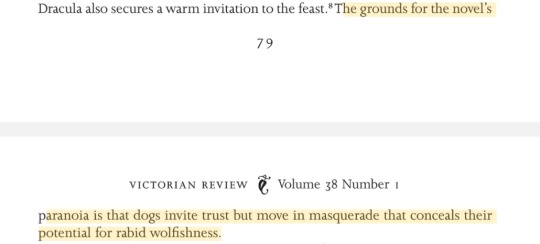
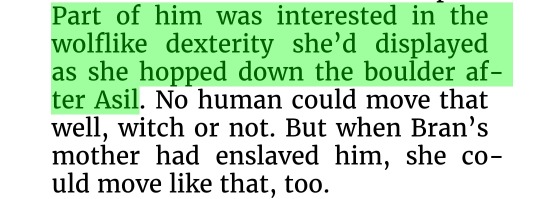







Patricia Briggs, Cry Wolf
Keridiana Chez, “You Can’t Trust Wolves No More Nor Women”: Canines, Women, and Deceptive Docility in Bram Stoker’s Dracula
22 notes
·
View notes

